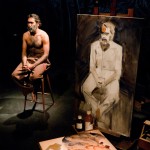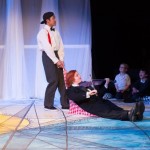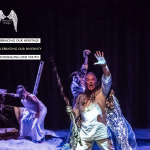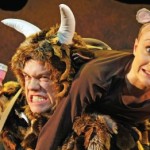The Amazing Vancetti Sisters
Genre: Drama
Venue: Tristan Bates Theatre 1A Tower St, Covent Garden WC2H 9NP
Low Down
Children do not ask to be born. The majority of children are ‘treasured’ but some, sadly, experience growing into adulthood as a kind of death-defying act which they are lucky to survive. Athena Stevens’ The Amazing Vancetti Sisters shows sisters Jane and Elisa dealing with the legacy of being born to the ‘Great Vernon Vancetti’, a Las Vegas magician: the originality and power of her playwriting forges an epic struggle for self-determination. In her play’s presentation of an illusionary ‘magic childhood’, the sisters become anyone and everyone who struggle to become independent and fulfilled human beings.
Review
The fact that the eighty minute Amazing Vancetti Sisters does not have an interval is entirely appropriate: as is its cohesion of one location, set in the lounge room of the Vanzetti family home, coupled tightly with the strained tensions between the play’s three characters. The structure of the play moves apace as it alternates between episodes of intensely entertaining dialogue between the sisters, Jane (Athena Stevens) and Elisa (Lorna Beckett); Jane and her boyfriend Michael (Timothy Knightley); Elisa and Michael and scenes with all three characters.
The strength of Steven’s characterisation is in the physicality of the acting on stage: movements, gestures and utterances are crafted in detail. Brecht and his acting method ‘gestus’ comes to mind, but so does watching the subtly of a Chekhovian comedy. These complex, well-defined characters are also pitted against the virtual presence of newsreaders and actors whose voices are heard, but not seen, from the television box. And if this is not enough, the virtual characters are augmented by other remembered characters who are merely called up by name such as the sisters’ now dead father Vernon Vancetti and his apprentice, Adam or appear as generalised categories like Michael’s ‘other women’ and ‘the people’ of the small town of Baker who Elisa believe are constantly judging her. Though not present, these characters wield a strange illusionary power in the play: their effect on the relationships of the characters on stage packs even more tension between them.
By far the most influential character in the play is the father Vernon Vancetti whose work as a magician sets up the pivotal relationship between the two sisters. The older sister, Elisa, is overlooked for the young one, Jane, when Vernon with Prospero-like acumen decides the role each will play in his act: Elisa is to be backstage playing piano while Jane is to remain with him on stage as his support act.
Lorna Beckett’s portrays Elisa with a cold steely fixation that is reflected on stage through her obsessive cleaning. All emotion is masked by rambling chatter about removing spots from carpets. The director, Hanna Berrigan, and set designer, Nicky Bunch, fully exploit her paranoia and obsessions as she is shown moving around the space pulling out the various props: an axe under the settee, diamond-studded high heels from the cupboard. These are props once used in Vernon’s act. Their reappearance no longer assists in creating his illusions but reveals their real intent: the subjugation of his daughters’ lives to his will.
Athena Steven enacts Jane as Elisa’s nemesis: where Elisa is compliant, Jane is argumentative; where Elisa is dutiful, Jane is irresponsible. More importantly where Elisa has decided to remain in Baker holding onto memories of the past, Jane will have none of them. The portrayal of the sisters through oppositional characteristics is complexly layered. The ethical dimension of what constitutes ‘good’ and ‘bad’ between them is thrown out to the audience to decide. It is not an easy thing to do as Steven’s presents Jane to be as fiercely manipulative as the father whom she is trying to convince her sister to abandon, even if only now in memory.
Tim Knightley’s Michael is appropriately confused, as anyone would be if they fall between two combative sisters with a long history of family dysfunction. The actor’s restraint shows his skill at working in an ensemble. Stevens explodes his role as an Adonis-like hedonist bartender working at a strip-club as well. Michael is given one of the most moving monologues of the play when he explains ‘Magic isn’t when people disappear… it’s when they come back’. The transformative effect on the fiercely independent Jane is subtle and totally believable.
I recommend that you run and buy your tickets and see The Amazing Vancetti Sisters. It is a beautifully intelligent piece of theatre that gives its audience a profound experience of human resilience and personal courage. The term ‘family dysfunction’ somehow can no more describe what you will view on stage than it canKing Lear and his belligerent daughters. The truth is more that there are some stories that just take us somewhere else in our hearts, mind and soul. This is one of them.
Reviewed by Josey De Rossi Thursday 8th September 2011
Website :
http://aegisproductions.co.uk/
Director: Hanna Berrigan
Cast: Lorna Beckett, Timothy Knightley, Athena Stevens
Set designer: Nicky Bunch; Lighting: David Plater





